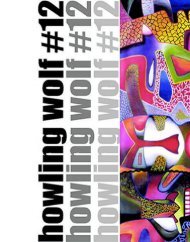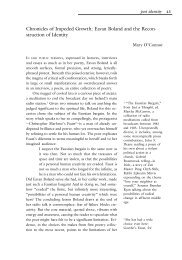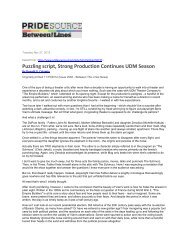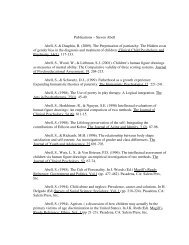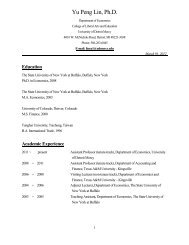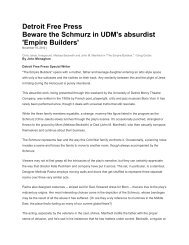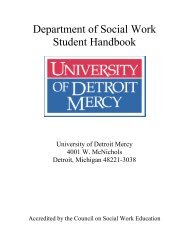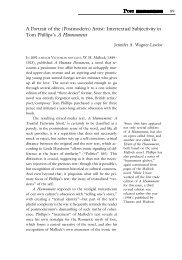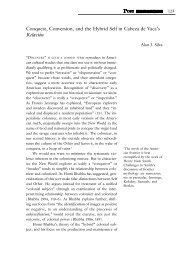Kazuo Ishiguro's Persistent Dream for Postethnicity: Performance in ...
Kazuo Ishiguro's Persistent Dream for Postethnicity: Performance in ...
Kazuo Ishiguro's Persistent Dream for Postethnicity: Performance in ...
Create successful ePaper yourself
Turn your PDF publications into a flip-book with our unique Google optimized e-Paper software.
sembles what many characters undergo, regardless of racial<br />
difference. In addition to the str<strong>in</strong>g of ag<strong>in</strong>g, self-deluded<br />
males, young boys likewise take after one another. The<br />
spoiled, wh<strong>in</strong>y Japanese boy Akira of Pale f<strong>in</strong>ds his own<br />
mirror image <strong>in</strong> the grandson Ichiro of Artist, subsequently<br />
trans<strong>for</strong>med <strong>in</strong>to the overweight, sulky Boris of Unconsoled.<br />
Characters are carry-overs from one book to the next because<br />
the fundamental human emotions explored through<br />
them are identical, namely, that of an unconsolable guilt<br />
and empt<strong>in</strong>ess. Despite Etsuko’s whitewash<strong>in</strong>g of her past,<br />
despite Ono’s courage and good will toward the new Japan,<br />
despite Stevens’s brac<strong>in</strong>g <strong>for</strong> the rema<strong>in</strong>s of his days,<br />
despite Ryder’s keep<strong>in</strong>g up of appearances, their lives are<br />
revealed to be irrevocably void of human warmth. To some<br />
extent, this preoccupation with the shared human condition<br />
accounts <strong>for</strong> some reviewers’ compla<strong>in</strong>t of the lack of<br />
<strong>in</strong>dividuality <strong>in</strong> Ishiguro’s characters, who are likened, rather<br />
mean-spiritedly by Louis Menand, to “papier-mache animations”<br />
(3) operat<strong>in</strong>g accord<strong>in</strong>g to some technical manual<br />
on gradations of human emotions.<br />
This thematic refra<strong>in</strong> culm<strong>in</strong>ates and <strong>in</strong>tensifies <strong>in</strong><br />
Ishiguro’s most recent novel, a refra<strong>in</strong> that so irritates certa<strong>in</strong><br />
reviewers that they parody the title as “uncontrolled,”<br />
“unrelent<strong>in</strong>g.” Jeff Giles describes it as “dull, repetitious,<br />
long-w<strong>in</strong>ded, long-w<strong>in</strong>ded, repetitious, dull…It’s as if he<br />
got sick of read<strong>in</strong>g about how compact his prose is—how<br />
he’s the poet laureate of the unspoken and the unexpressed—and<br />
suddenly retaliated with his dense snowstorm<br />
of words” (92F). Will Blythe agrees that “fatigue sets <strong>in</strong><br />
because The Unconsoled is curiously one-dimensional…The<br />
novel successfully embodies the dream logic of the unconscious,<br />
but that seems to be all it does” (65). This damn<strong>in</strong>g<br />
assessment is echoed by Ned Rorem: “The situation, a<br />
bad dream from which Ryder will never awake, is Kafka <strong>in</strong><br />
reverse…But at least Kafka is concise and visionary, whereas<br />
Ishiguro is directionless and undifferentiated” (157). Other<br />
reviewers see this, nevertheless, as an accomplishment. Tom<br />
Wilhelmus ma<strong>in</strong>ta<strong>in</strong>s that “Ishiguro has created a monument<br />
to boredom, accident, <strong>in</strong>difference, obtuseness, pretension,<br />
and misunderstand<strong>in</strong>g—a great negative adventure<br />
that is at once darkly humorous and a strik<strong>in</strong>g moral<br />
Sheng-mei Ma<br />
POST OST IDENTITY IDENTITY 77



